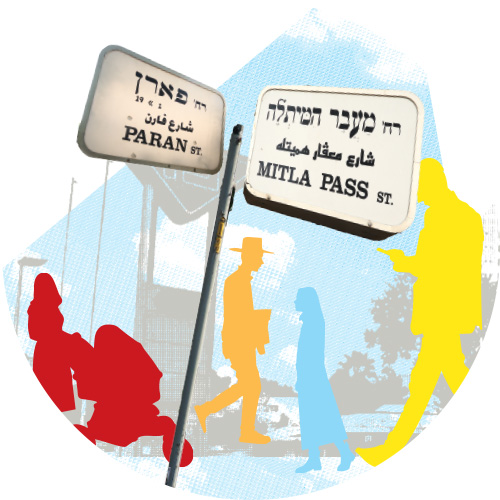Growth Curve: Chapter 20

“This Shabbos we’re not having any bochurim. I keep thinking about what you said and everything that happened… I want to get my balance back”

Benny woke up on Wednesday morning with a firm resolve: He was going back to the Mir. It had been days since he’d been there, and weeks since he’d really felt at home on the benches of Beis Yeshaya. Since Kroizer had given his ultimatum — 10,000 shekels or leave — he’d felt like an interloper pretending to be something he wasn’t.
But last night it had felt good to learn with Borenstein, to realize that Benny Muller, the solid learner, the guy who kept sedarim and schedules and commitments, may have gotten sidetracked but hadn’t disappeared. Now he wanted to be back in that big building with the hum of people discovering truth over and over again every day.
You don’t have to cover up who you are, he had told Meir yesterday. Even if you’re not that perfect black-and-white yeshivish guy, even if your parents don’t have gedolim pictures on their walls, this belongs to everyone.
Tziporah was packing up the kids’ lunches when he got home from Shacharis. He roused Meir, who pulled himself together quickly. “I’m taking my kids to gan,” he told him, “and then I’m going to the Mir. How about you head there straight from Shacharis?”
Meir nodded.
“I’ll be in Beis Yeshaya, fourth floor, front left of the beis medrash. If you don’t find me, ask around.”
Benny left his bike at home; he wanted to walk this time, think through the sugya methodically.
Borenstein nodded in welcome when he stepped into the beis medrash. Benny sat down and settled in. This was his too. Even though he didn’t have a father-in-law paying his way. Even though he didn’t have the right résumé, the yeshivish family, the perfect pedigree.
Midway through first seder, Meir Elbogen appeared in the back of the beis medrash.
“Hey, Meir!” Benny waved him over. “Good to see you, man.”
Meir gave a half-nod.
“This is my chavrusa,” Benny said, indicating Borenstein. “My long-suffering chavrusa, I should say.”
Meir took in Shimmy Borenstein with a calculating look. Borenstein managed the scrutiny just fine; he looked right back curiously.
“How do you know Benny?” he asked.
“He works in my yeshivah,” Meir said.
Borenstein’s eyebrow arched for a half-second. “You’re a Ner Olam guy?”
Meir shrugged defensively. “And if I am?”
“Some of the most solid learners started out as good Ner Olam guys,” Borenstein said. “That’s why Benny over here isn’t really going to be able to talk to you right now, because he’s in the middle of first seder. And he’s a really solid learner.”
Benny smiled. “True. But I’m open for lunch. Can you stay busy here until then, Meir?”
“Okay,” Meir said.
Benny watched him wander around the periphery of the beis medrash, then turned back to his Gemara.
When lunchtime came, he took Meir over to Miro’s falafel shop — he figured he may as well give Meir the full experience.
“I think you can probably pick up your stuff from my apartment and head back to Ner Olam soon,” he said as Meir finished the last pickle on his plate. “The big bechinah was this morning, and this afternoon the guys are celebrating with a trip to the beach. The dorm will be empty — no one will be around to ask questions or anything.”
“Okay, thanks,” Meir said. The words were lukewarm. He grabbed two bentshers and brought them to the table. He zipped through the words absently, then tapped on the table while Benny finished.
“I’ll pay, you can wait for me outside,” Benny said.
Meir walked out, and Benny dialed Avi.
“Hi, Avi, it’s Benny Muller,” he said.
“Ah, Benny Hagibor,” Avi said.
“I think this might be a good time for Meir to go back to yeshivah,” Benny said hesitantly. “But you said it might not be safe, that you wanted to come along… Are you back in Yerushalayim yet?”
“Yes, I’m back,” Avi said. “How about I meet you two in an hour-and-a-half, around 3:30, outside your house. I’ll bring him back to yeshivah and then I’ll keep an eye on him.”
“Sounds good,” Benny said, and he rattled off his address.
Benny led Meir downstairs at 3:30. A silver Mitsubishi Outlander was waiting in the parking lot. As soon as they stepped into the sunshine, the driver’s door opened and a man emerged. He was around Benny’s height — just above average — but beneath his short-sleeved polo shirt, the thick neck and broad shoulders broadcast confidence and brawn.
“Benny, mah shlomcha,” he said as he took three swift steps forward and extended his hand.
Benny shook it. “Hi, Avi, I’m good. Nice to finally meet you.”
There was something tightly wound up about this man, despite the ease of his movement and relaxed cadence of his steps. It must be the manner of someone constantly on watch, Benny realized, as he saw Avi swiftly appraise his surroundings. His smile stayed in place, but his eyes were studying the building, the bushes, the stone ledges. Then he stared at Meir. “This is your bochur’chik?” he said.
Benny put out a protective arm. “Yes, this is Meir. He wants to go back to yeshivah. You know how to get to Geula from here, right?”
“What do you think?” Avi said. “I grew up around here, in the Shmuel Hanavi projects. I know this area back from when I was little. Before you American yeshivishers took over the neighborhood.”
Benny stiffened. Was that an accusation?
“It’s okay, no offense,” Avi said. Wow, he was perceptive. “Neighborhoods change, people move on. Where you live is important, having a chevreh is important, but the main thing is family. As long as you have your family, you can start again anywhere.
“I wouldn’t want to live in those projects anymore,” he said, jerking his head in the direction of Rechov Shmuel Hanavi. “I mean, it’s nice to visit, show the kids where Savta hung her laundry, how she fit 11 kids into one bedroom… But to tell you the truth,” he nodded toward his spiffy car, “I don’t belong there anymore.”
Now he turned back to Meir. “Meir is the name? So listen, Meir. Your friend Benny asked me to help you out. We’re going back to yeshivah. You do your thing, your Rashi and Teisfos.” He smirked with enjoyment at the affected litvishe accent. “I just don’t want you to be surprised if your friend with the plane ticket checks up on you.”
Meir startled.
“Hey, we’re not gonna leave you alone,” Avi said. “Your friend Mr. Benny asked me to help you out. What did you think, I’m a car service? Ha. I’m gonna hang out there, I’ll keep an eye on things, make sure you’re safe. You’ll be okay.”
He patted Meir on the back. “Ready?”
A cautious nod from Meir.
“Take care of yourself, man,” Benny said, giving Meir a quick pat on the back. “And call me if you need anything.”
“Okay,” Meir said. He climbed into the Outlander. Avi sat down, closed the door with surprising gentleness, and drove away.
Benny thought about the building in Geula where he’d spent so many afternoons, the building where he’d discovered himself and watched the process happen for so many others. Would he ever find a place there again?
He watched the silver car climb toward Sderot Eshkol, then turned and walked back up the stairs.
Finally, the apartment was completely, totally quiet. Benny had gone to night seder again. The kids were sleeping; Yehuda had stopped calling from his bed.
Tziporah opened up the warped Formica cabinet with its avocado-green trim and pulled out the mixer. Her stash of challah in the freezer was running low; this would be a good time to put up a batch of dough.
Wait, the DSL line was ringing. “Schick, Dina,” the caller ID announced.
Tziporah grabbed the phone and attached the headset. “Hi, Dini,” she said. “How are you? How’s everything?”
“Everything’s good,” Dini said. “Great, actually. Shimmy just got a bonus — his boss is really happy with this project he just did — and we decided that the kids are old enough for us to leave them for a week. We want to come to Eretz Yisrael!”
“Oh, wow, that sounds amazing,” Tziporah managed as her stomach dropped.
Dini was always rhapsodizing about Benny and Tziporah, the idealistic team who inspired all the bochurim in Eretz Yisrael. What would she actually see when she arrived?
“I know!” Dini went on. “I dream about Eretz Yisrael all the time, and now it’s finally going to happen — the Kosel, those narrow little streets in Meah Shearim, the Yerushalmi kids with their white yarmulkes….”
Tziporah measured two-and-a-half tablespoons of yeast and poured them into the warm water. She gave the mixture a gentle stir.
Dini was still lost in her fantasy. “We just need to figure out how to fit everything in — Kever Rochel and Meron and Amukah and Geula and the Tunnel Tours and Machaneh Yehudah and Yam Hamelach. I’m already on such a high! Almost like being back in seminary, just with a husband this time.”
The yeast was bubbling now. Tziporah poured in the flour, then fit the dough hook into the mixer and turned it on low. Dini was still talking.
“Plus, you know what Shimmy says — no one in America knows how to make a really good shawarma. So that has to go on the list too, he keeps talking about this place on a tiny street in Geula that he says is the best. And my sister lives there! That makes it even better. I can’t wait to see the perfect couple and your cuties!”
“That’s for sure the best part,” Tziporah agreed. “I can’t wait. Let me know when you finalize the tickets, okay? I’ll put it down on my calendar.”
“Great, and do you think that I should make a reservation for — hang on, that must be the Amazon guy…. I’ll be in touch, okay?”
Tziporah removed the headset and put it down on the little kitchen table. She watched the dough hook knead the shaggy mass and compared her sister’s impressions of Eretz Yisrael with her own. Living here, working here, cleaning chickens and cleaning bathrooms and paying bills, was it all about the Kosel and Amukah?
The dough had formed its usual neat ball. She turned off the mixer, oiled a large bowl, and tried to open the creaky drawer that held the dishtowels. The drawer was jammed again — either the metal track had gotten even rustier or the wood was just too swollen and misshapen to slide out. Finally, after a mighty battle, she yanked it open.
This wasn’t working. They couldn’t stay in this apartment too much longer. The entire neighborhood was swiftly becoming too expensive for them. Even if the economy would stabilize, even if the inflation would settle, Tziporah had been dealing with numbers long enough to know that once a price is raised, it rarely goes down.
If they couldn’t stay in the area, maybe they couldn’t even stay in Yerushalayim, why would they stay at all?
She replayed Dini’s bubbling monologue: Kever Rochel and Meron and Amukah and Geula and the Tunnel Tours and Yam Hamelach… Was that the reason?
Maybe if you’re a tourist. But living here is not a tourist experience, Tziporah thought as she transferred the dough into the waiting bowl and pulled the dishtowel over it. Some of the young couples in the neighborhood managed to stretch that initial honeymoon to a year or two, living as resident tourists on perpetual vacation. But not everyone.
Not even most, she thought, as she mentally ticked through the women living up and down the block. Dini was the type to visit for seven days and make it to the Kosel at least 12 times. But that’s not my life, Tziporah thought. That’s not my reality.
She was braiding the challah when Benny came home. Usually, after night seder, he went to the computer to check on his favorite teams. Now he stood awkwardly at the kitchen counter, watching her hands tug and weave the smooth strands of dough into neat loaves.
“How’s it going? Looks like you’re busy,” he said. The words were casual, but there was a contriteness there, almost like a pleading little boy: Please don’t ignore me anymore, please let’s talk.
She nodded. “We’re running low, so I decided to stock up,” she said, deftly tucking the last ends of dough beneath the loaf. “Dini called. She and Shimmy are planning to come here on vacation sometime soon — he got this bonus from work, and they haven’t been here in so many years.”
Benny looked at her. “Wow. That’s so nice. I mean, it should be so nice. But you’re not excited.”
She moved the finished loaf onto a baking pan and marveled at her husband. After all his mistakes, all his miscalculations, he still got her. He was still Benny Muller who could intuit a complex human dynamic from half a sentence.
“Yeah,” she agreed. “I’m not. I guess I’m just confused. Here my sister is so excited to come — the Kosel, Amukah, Yam Hamelach — while I’m wondering if we belong here anymore. Ten thousand shekels is just too much for us to pay every month, and I don’t think we’ll find anything significantly cheaper in the neighborhood. All the rents are going up. Everyone’s dealing with this. If we can’t figure it out, what’s our next step? Do we go back to America? But what about the Kosel and everything else, all the reasons people are dying to come?”
Benny sat down on a kitchen chair and rubbed his hands over his eyes. “I hear you,” he said. “All those things that pull the tourists — you know, the restaurants and hikes, even the important stuff like the Kosel and the kevarim — if you’re living here, that isn’t the reason. It can’t be. You can’t base your whole relationship with your city or country on that.”
“Right,” Tziporah said. He really had gotten it right. She turned to face him. “Benny, what did you mean when you told me you’re leaving Ner Olam? Is that for real?”
Benny rubbed his eyes again. “It was for real, yeah. I couldn’t see myself going back there, after everything, the Melaveh Malkah.”
“And now?” Tziporah asked. She didn’t have to say, “Now, after the Rosh picked you from the entire staff to help out Meir” — but he knew what she meant.
“Now I’m not sure, if you want to know the truth,” Benny said with a crooked smile. “But one thing I’m sure about: This Shabbos we’re not having any bochurim. I keep thinking about what you said and everything that happened… I want to get my balance back. I want to spend the entire Shabbos focused on our family. Sounds good?”
Tziporah nodded. “Very good,” she said.
to be continued…
(Originally featured in Mishpacha, Issue 943)
Oops! We could not locate your form.



